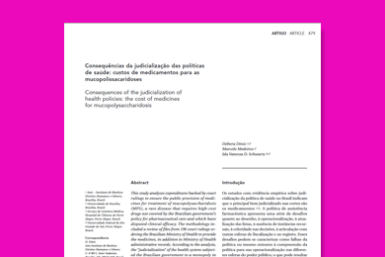
This paper analyzes expenditures backed by court rulings to ensure public provision of medicines for treatment of mucopolysaccharidosis (MPS), a rare disease that requires high-cost drugs not covered by the Brazilian government’s policy for pharmaceutical care and clinical efficacy. The data collection methodology included a review of files from 196 court rulings ordering the Brazilian Ministry of Health to provide medicine from 2006 to 2010, in addition to Ministry of Health administrative records. The analysis indicates that this “judicialization” subjected the Brazilian government to a monopoly in the distribution of medicines and consequently led to the incapacity of managing drug purchases. It also indicates that the imposition of immediate, individualized purchases prevents economies of scale with planned purchase of larger amounts of the medication, in addition to imposing logistical difficulties to control consumed and stored amounts. In conclusion, litigation stems from the lack of a clear healthcare policy for rare diseases in general, which leads to excessive expenditures for MPS treatment.